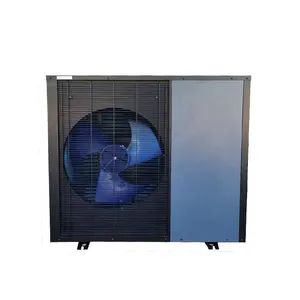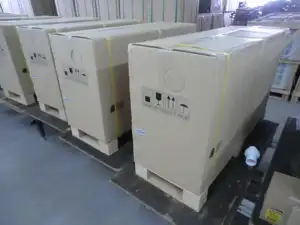(4364 products available)




































































 Ready to Ship
Ready to Ship












































































 Ready to Ship
Ready to Ship
















 Ready to Ship
Ready to Ship












































A 20 kW heat pump is a heating and cooling system that can produce 20 kilowatts of heat energy to warm a space in one hour. These are efficient systems that can be used in residential and commercial spaces. It is available in different types, which include;
Air-to-water heat pump
The air-to-water heat pump works by drawing heat from the outside air, even in cold temperatures, and transferring it to the water that is heated and circulated around the building. This type of heat pump works efficiently in moderate climates and can provide space heating as well as water heating.
Ground source heat pump
Ground-source heat pumps, also known as geothermal heat pumps, use the earth as a heat source in winter and a heat sink in summer. They are highly efficient and reliable, regardless of the weather conditions. GSHPs have lower operating costs and are ideal for commercial buildings or areas with sufficient land.
Water source heat pump
Water source heat pumps extract heat from various bodies of water, such as lakes, rivers, and well water. Efficient and environmentally friendly heating and cooling are provided by these pumps. They are suitable for both residential and commercial buildings.
Hybrid heat pump
Hybrid heat pumps combine air conditioning, heating, and water heating technologies. They are efficient and intelligent systems that can use renewable energy sources and adapt to the changing weather conditions.
Air-to-air heat pump
Air-to-air heat pumps transfer heat from the air inside to the air outside during winter and vice versa during summer. These units provide efficient heating and cooling for residential and commercial buildings. They are also known as ductless mini-split systems.
The 20 kW heat pump is meticulously engineered to deliver exceptional heating performance for various applications, including residential spaces, commercial establishments, and industrial purposes. With its robust 20 kW power output, it effectively meets the heating demands of larger areas or environments with significant heat load requirements.
In the heating system, Heat pumps offer a more eco-friendly alternative to conventional heating methods by utilizing renewable energy sources. They use electricity to transfer heat from one place to another instead of generating heat directly, which helps reduce carbon emissions and contribute to sustainable practices.
One of the key advantages of heat pumps is their versatility. They not only provide space heating during colder months but can also be reversed to offer cooling in warmer seasons. This dual functionality makes them an efficient solution for year-round climate control.
Additionally, heat pumps are known for their energy efficiency. They have a high coefficient of performance (COP), meaning they can produce more heating or cooling output per unit of electricity consumed. This helps lower energy costs and enhances overall efficiency.
Regarding features, a 20 kW heat pump typically comes with advanced technology components to optimize performance and efficiency. These may include electronically commuted (EC) fans for better airflow management, variable speed compressors for adaptable operation, and intelligent control systems for precise monitoring and adjustments of the working parameters.
Moreover, many heat pumps are designed with durability and resilience in mind. They are often equipped with weather-resistant cabinets suitable for outdoor installation, anti-corrosion protection to withstand harsh environmental conditions, and high-quality refrigerants that ensure reliable operation over time.
Residential heating and cooling:
Apartments, single-family homes, and larger residences all fall within the broad category of residential buildings. A 20 kW heat pump can be beneficial for homes that have higher heating requirements, such as older homes or those that are located in colder climates. The heat pump works by extracting heat from the outside air (even in cold temperatures) and transferring it inside to keep the home warm. During the summer months, the system can be reversed to provide efficient cooling by removing heat from the indoors and releasing it outside, functioning as an air conditioning system.
Commercial space heating and cooling:
Heat pumps are commonly used in various types of commercial buildings, such as offices, retail stores, restaurants, and hotels. A 20 kW heat pump can be used in smaller commercial spaces or in larger buildings where a single distributed heating and cooling system is required. In commercial applications, heat pumps can provide space heating in the winter, maintaining comfortable temperatures for employees and customers. During warmer months, the cooling function of the heat pump helps to create a pleasant indoor environment, contributing to energy savings for the business.
Industrial processes:
Industries like food processing, textiles, and metalworking use heat pumps for their production needs. A 20 kW heat pump can serve as a useful resource for facilities that require consistent heating to carry out their operations. It can be used for process heating, preheating water, drying, and other industrial processes that necessitate heat. By integrating heat pumps into industrial processes, businesses can benefit from reduced energy costs and improved operational efficiency.
Water heating:
Heat pumps are effective for heating water in various applications, such as residential hot water supply, swimming pools, and industrial processes. A 20 kW heat pump can be used for hot water production in homes, generating enough heated water for showers, appliances, and other domestic uses. In swimming pools, heat pumps can efficiently heat the water to maintain comfortable temperatures for poolgoers. Industrial facilities that require hot water for cleaning, processing, or other functions can also utilize 20 kW heat pumps for economical water heating.
Geothermal applications:
Geothermal applications involve utilizing the earth's natural heat for heating and cooling purposes. A 20 kW heat pump can play a major role in geothermal systems, where it extracts heat from the ground (in colder months) or dissipates heat to the ground (in warmer months) to provide efficient heating and cooling. In a ground source heat pump system, a 20 kW heat pump works in conjunction with a network of underground pipes filled with fluid. The earth's relatively stable temperatures act as a heat exchange medium, allowing the heat pump to efficiently transfer heat.
Factors to consider when choosing a 20 kw heat pump include;
Q1: What does "20 kW" mean in a 20 kW heat pump?
A1: The term "20 kW" specifies the heating capacity of the heat pump. In this case, 20 kilowatts (kW) is a measure of the pump's heating output. One kilowatt equals about 3400 British thermal units (BTUs) per hour, so a 20 kW unit can produce around 68,000 BTUs/hour of heating power. This capacity is suitable for larger homes or buildings, depending on the specific heating needs.
Q2: How does a heat pump work for heating?
A2: A heat pump works by transferring heat from one place to another using a refrigerant and a compressor. In heating mode, it extracts heat from the outside air (even in cold temperatures) and pumps it indoors to provide warmth. The process is similar to how a refrigerator removes heat from its interior -- using vapor compression to move the heat using coils and fans circulating the refrigerant.
Q3: What are the benefits of a heat pump system?
A3: Some advantages include higher energy efficiency than conventional electric or gas heating, as heat pumps transfer existing heat rather than generating it. This can result in lower heating costs. Additionally, heat pumps provide both heating and cooling functions, so they can replace separate air conditioning units. They also have less environmental impact by using electricity instead of fossil fuels and generating fewer carbon emissions.
Q4: Do heat pumps work in very cold climates?
A4: Modern inverter ductless mini-split systems excel at cold-weather performance down to -15F and beyond, providing homeowners with peace of mind during the chilly New England winters. The enhanced low-temperature refrigerant and inverter technology work tirelessly to maintain consistent, efficient heating even in frigid conditions. With multiple units, users can optimize comfort and efficiency by adjusting heating levels in different zones according to usage patterns and preferences.
Q5: How should a heat pump be maintained?
A5: Regular maintenance helps ensure efficient operation. This includes cleaning or replacing air filters, cleaning the indoor and outdoor coil surfaces, checking refrigerant levels, and having a professional inspect the system annually. Heat pumps also have long life spans with proper care, usually over 15 years.